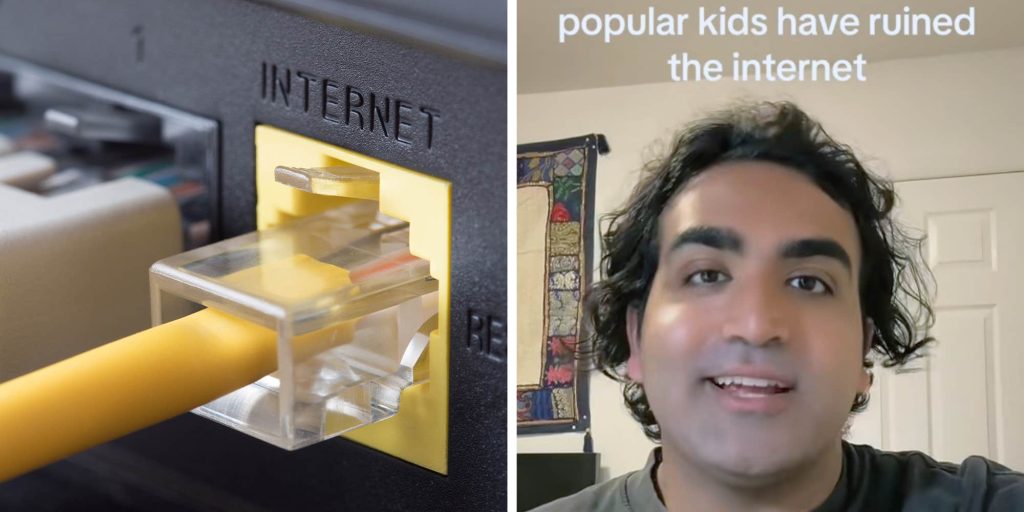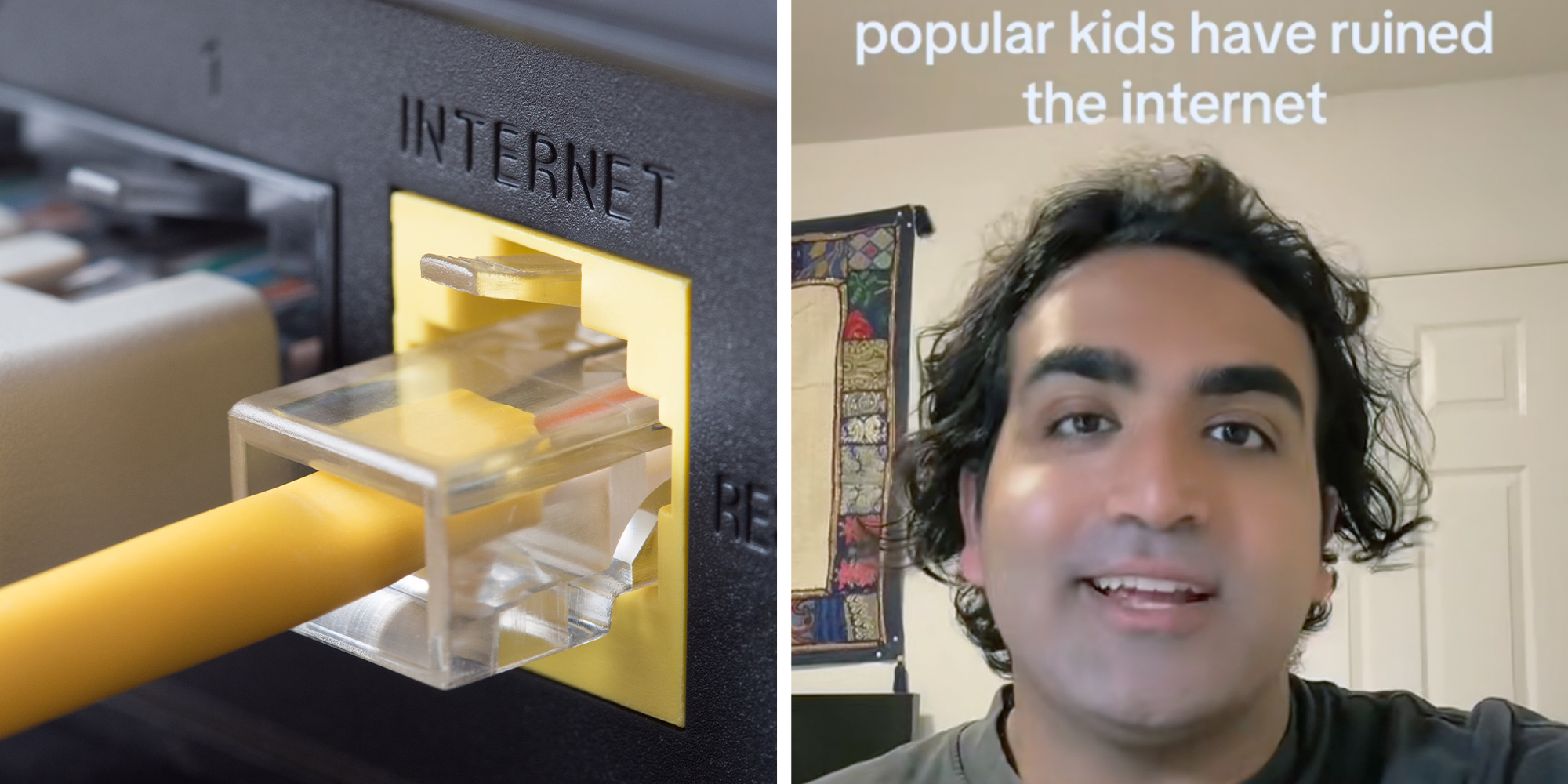
Have popular kids ruined the internet? Viral TikTok sparks online discussion: “The internet was better when it was just on computers”

A man has sparked discourse on TikTok by claiming that “popular kids have ruined the internet.”
In a video posted to the platform on Oct. 2, Kushal (@skskskushal) presented his theory: that the decline of the internet from its peak around 10-15 years ago coincided with an influx of “normies” arriving online.
Commenters were divided on the issue, with many agreeing that the internet has become boring and mainstream, while others found Kushal’s claims childish and overexaggerated.
Kushal’s theory is not new, having been discussed in online circles for years, with causes put forward including the advent of the smartphone, the switch to algorithmically-discovered content, and the rise of content creators and influencers.
What happened in the video?
The video was first posted to TikTok on Oct. 2 alongside the caption, “eye rolling at pretty people humor”, where it received over 180K views. In it, TikToker Kushal spoke to viewers about the point in history the internet changed from a place of community and discovery to one of stagnation, and why he felt this was.
“Think a big reason, among others, why the internet sucks and influencers suck nowadays, is that we have let popular kids ruin the internet,” he said. “If you look at the internet and influencers from 10 to 15 years ago, it was people who existed more on the fringe of your everyday society. And that was because mainstream adoption of the internet and social media was still growing”, he explained.
Kushal went on to clarify that in the earlier days of the internet, creators who made it big tended to be from “niche populations” with “diverse points of view”, including people of color and queer people. He explained that these were typically the sort of kids who would’ve been viewed as weird or quirky in the offline world—but the online world was where they thrived.
@skskskushal eye rolling at pretty people humor #internet #prettyprivilege #popularkids #2010s #queer ♬ original sound – kkkkkkkkkushal
“These were kids who grew up being bullied, grew up feeling different, grew up feeling like they weren’t part of the mainstream,” he told viewers. “But as the internet has grown more mainstream and it has become the predominant place for media consumption, music discovery, even TV, the power structures of the online world have become way more what constitutes power in the offline world.”
Many commenters were in agreement, especially those with experience of the early internet in the 10-15 year period Kushal mentioned, and before this into the early oughts.
“The internet was cool when it was weird and fun,” one person said, while someone else clarified, “The internet was better when it was just on computers.”
“Nobody was afraid to be cringe, and that’s how we got so much gold,” wrote Brujita Boutique.
“This combined with the lack of kids/tween spaces on the internet (meaning they’re now using the same platforms as adults) has totally wrecked everything, especially fandom spaces/fandom culture,” explained reg.



However, not everyone agreed, with some feeling that Kushal was too old to be talking about the internet like it was high school.
“Popular kids at your big age is crazy,” someone said, while someone else felt that, “The internet was not niche 10 years ago.”
Others felt the problem was instead a result of late-stage capitalism, rather than any one group of people.
“It’s not popular kids, it’s corporate greed,” wrote ambientspark.
Is this a new take?
Kushal spoke with The Daily Dot via TikTok DMs to defend his take, reflecting on the unique nature of the old internet.
“Growing up online in the 2010s, I found the world of internet creators to be unique from that of TV, print, film, and more. I loved certain books, movies, and TV shows, but I didn’t identify deeply with them the way I did with creators online,” he explained. “The creators of the early/mid 2010s didn’t shy away from the real topics, struggles, and joys of being on the fringe—the everyday manifestations of depression, queer friendships in real life, relationships with immigrant parents, and more. It was as if the internet was filling a gap in community and expression left by the offline world.”
He also took time to clarify what he meant by the term “popular people.”
“To be clear, I’m in my late 20s and far removed from the social power dynamics of high school hallways,” he explained. “But I was particularly inspired when I saw ‘pretty people humor’ become a source of scrutiny on TikTok. Users cited clips of young influencers (largely blonde and white) amusing each other with jokes that viewers found unfunny and awkward. As it (unsurprisingly) turns out, these folks aren’t popular because of their humor, talent, relatability, or courage to speak about marginalization. It’s their existing proximity to social power, and the content that they can create with that power, that makes them famous,” he said.
“I found this frame of ‘popular kids’—those who see themselves in the mainstream culture, not the fringe—as a fitting metaphor for the kinds of people that have taken the throne of internet fame and profit. And on the internet, it definitely goes far beyond any age or school setting,” he elaborated.
While his take has inspired many in the comments to share their longing for the old internet, Kushal’s take is nothing new. It is, in essence, simply a rehash of much broader discourse that has been floating around the internet for many years now.
For example, in a Reddit post from 2 years ago on the subreddit r/TrueUnpopularOpinion, u/RyzenX231 wrote that, “the internet was better off when it was niche”, and “when it was just a hobby you took part in for a couple of hours a day,” blaming the “normie invasion” for the internet’s stagnation.
“Most people suck, so if most people are doing a thing, that thing is eventually going to suck,” wrote one user, speculating on why this had happened.
“Peak internet was right around the time high-speed internet became available to the masses. It has been all downhill since,” said someone else, also questioning whether this was truly an unpopular opinion.


Another similar Reddit post to the same subreddit was much less kind to OP u/Hungry-Caterpillar91, who wrote that, “Normies have ruined the internet and should be banned from using it.”
“The internet used to be so great, and then it was ruined around the time the iPhone became popular. It gave every weird normie the ability to go online. Everything became full of weirdos who didn’t know what they were doing. The internet and computers have lost all personality and soul, and everything has been dumbed down, so that stupid people who only speak in emojis and selfies can be narcissists,” they wrote dramatically.
“No matter how popular/unpopular your opinion might be, the non-satirical use of the word normie instantly invalidates said opinion,” commented u/DefaltJ.

So, it seems that while people generally agree with the idea that the internet is less fun than it used to be, those who are most vocal about this and use terms like “normie” and “NPC” are seen as too cringe to be taken seriously. Reasons for the decline of the internet also vary, and many seem to think that attributing such a complex event to something as tenuous as popularity is unfairly simple and reductive.
What was the point of no return, and what actually caused it?
Experts have talked about the decline of the internet for many years, and questioned why this has happened, and what the key events and turning points were in the web’s gradual decline. Touchstones that are often mentioned include the advent of social media and rise of the iPhone, the switch from following friends to content creators, and the dominance of algorithms in selecting personalized content for each user.
In recent years, the advent of generative AI, especially AI image creators, and the proliferation of AI slop has also added another layer to the iceberg, with many seeing the dead internet theory as a definite reality as bots start to outnumber human users on many platforms. This “enshittification” of the internet has led many to move offline, though it has also arguably led to decentralization in some cases as many users flock back to forums to discover community outside the mainstream.
In a piece for The Atlantic, Lora Kelley spoke to fellow Atlantic writer Ian Bogost about why the internet feels boring now.
“Is it inevitable that products will become boring once they become the mainstream? Is there any way around that, or are we stuck in a cycle of novelty to boredom?” she asked, to which Bogost responded that, while this was true, it was actually a good thing.
“That’s the cycle, and it’s good. Boredom means that something is successful. When things are new, they feel wild and exciting. We don’t know what they mean yet, and there’s a lot of promise—maybe even fear,” he said. “But for something to truly become successful at a massive scale—for millions or billions of people to develop a relationship with a product or service—the product has to recede into the background again and become ordinary. And once it reaches that point, you stop thinking about it quite so much. You take it for granted.”
Bogost also revealed that he still appreciates the internet for what it is, though he accepts it has changed. “Being able to talk to family and friends as much as I want, for free, is still historically unusual and delightful. The fundamental feature of the internet still exists: I can look out and get a little buzz of delight just from seeing something new,” he explained.
This harkens back to a comment left on an earlier Reddit post complaining about the internet’s staleness.
“Then find the niche online communities. We’re still here,” wrote u/Toreachtheapex.
The internet is still a place of wonder and an avenue for queer people, people of color, other marginalized communities, and anyone else who considers themselves outside of the mainstream to connect and share their stories. You just have to look a little bit harder now, which, in a way, is even more akin to finding your tribe in high school in the pre-internet days.
The internet is chaotic—but we’ll break it down for you in one daily email. Sign up for the Daily Dot’s newsletter here.
Sign up to receive the Daily Dot’s Internet Insider newsletter for urgent news from the frontline of online.
The post Have popular kids ruined the internet? Viral TikTok sparks online discussion: “The internet was better when it was just on computers” appeared first on The Daily Dot.
Source link
Categories Social Media
Tags social media
